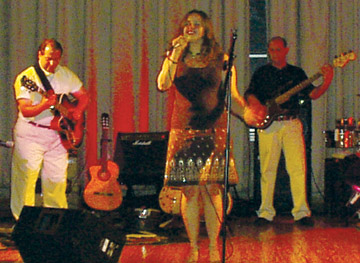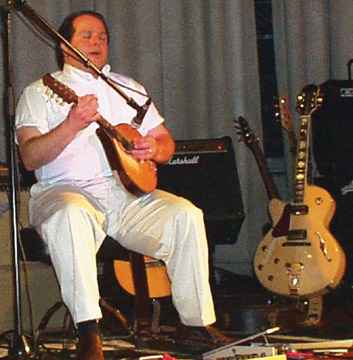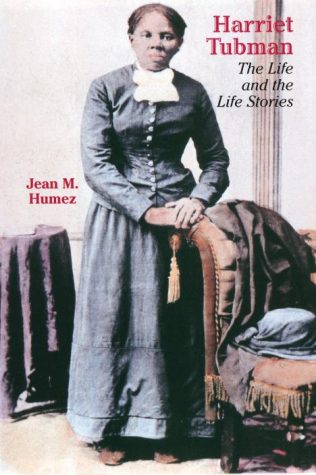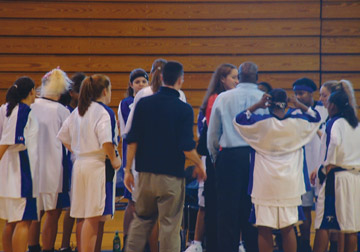A Brazilian Music Sampler

Adreza Mendes (center) performs the vocals of the ballad ?Samba de uma nota so.?
September 18, 2003
For week of September 9-13, UMass Boston was host to a spate of sights and sounds emanating from the culture of Brazil. Brazilian Cultural Week, sponsored by UMB’s Department of Hispanic and Latin American Studies, gave the attendees a taste of contemporary films ranging from the heavy-handed Bicho de Sete Cabecas (“The Seven-Headed Beast”), a movie exploring the effects of drugs upon family relations, to satire exemplifying the feminist and social politics of Brazil, O Auto da Compadecida (“The Dog’s Will”) and Anahy de las Misiones (no translation available).
On Saturday, September 13, however, after 4 days of visual stimulation, it was time for an aural treat, a music sampler filled with poetry and traditional songs. One of the speakers opening the program, that began over a half-hour late, was Ambassador Mauricio E. Cortes Costa, of the Consulate General of Brazil to Boston, who proudly recognized the “importance of Boston’s Brazilian community to our government.” Also in attendance was Dr. Jack Spence, a UMB Political Science Professor who described his first trip to Brazil, not expecting it to be all that much different than the other voyages he’d gone on to neighboring South American countries, as “like being a country boy and going to New York City.”
It was Pulitzer Prize-winner and UMB English Professor Lloyd Schwartz who kicked off the program with a reading of two of Carlos Drummond de Andrade’s poems, “In the Middle of the Road” and “The Seven-Sided Poem” before the music began. “Asa Branca” was an instrumental piece performed by Ari Mendes, the music producer and artistic director of the event, followed by “Samba de uma nota so,” a bilingual ballad of heartache that sounded vaguely like some American blues.
The poems were done as a tribute to de Andrade who created a literary style called cronicas, a merger of essays and short-fiction, and was also one of the leading poets of Brazil. Champion of poor children and political freedom, he especially focused on the struggles of immigrants in constrained city life.
Samba is a huge tradition in Brazil where there are different schools who compete each year in elaborate formations. Usually thematic, each town or neighborhood will sponsor a certain team in the hopes of winning both recognition and sponsorship. The musical style is loosely based on ballroom dance done in 4:4 but manages to combine the cultural traditions of the indigenous Indian, European, and African mix that makes up Brazil. With flashy costumes, rehearsals, and parade floats, preparation for the festival is countrywide, year round, and intensive.
“Corcovado” came next with vocals by singer Andreza Mendes. Most of the songs were done in Portuguese, the native tongue of Brazil, but were followed by an English translation, for which I was grateful, being unfamiliar with the language. Songs are best heard in the vernacular because they give a better feel for the flavor of the culture but it’s also nice to know just what the vocalist is singing about.
The rest of the program proved to be a mix of sounds ranging from country to folk to jazz. It’s difficult to tell from where the influence upon the music came because of the tripartite origins of Brazil’s people. The tune is exotic with no real definitive stamp of any single culture. It provides a pleasingly unique blend to the ear, a welcome escape from the constancy of most of the formulaic radio hits of today.























































